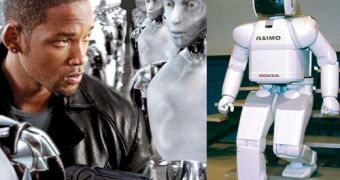Robots are already growing in complexity and their use in industry is becoming more widespread. The main use of robots has so far been in the automation applications of mass production industries, where the same definable tasks must be performed repeatedly in exactly the same fashion. Car production is the primary example of the employment of large and complex robots for producing goods. Robots are used in that process for the painting, welding and assembly of the cars.
Robots are good for such tasks because the tasks can be accurately defined and must be performed the same every time, with little need for feedback to control the exact process being performed. Industrial robots can be manufactured in a wide range of sizes and so they can handle more tasks requiring heavy lifting than a human could.
They are also useful in environments which are unpleasant or dangerous for humans to work in, for example bomb disposal, work in space Canadarm2) or underwater, in mining and for the cleaning of toxic waste. Robots are also used for patrolling these toxic areas.
Humanoid robots are about to become reality sooner than you think, and as you would expect, they will feature superhuman characteristics, like heightened senses, physical strength and computational abilities.
Along with the appearance of the first artificial intelligence, one particular aspect will have to be debated: robot rights.
Would a conscious robot need the same rights as a human being? Could robots one day take over the care of our aging population? Will robots be our soldiers of the future? When will robots be able to do all the housework? Will they be used as sex slaves?
These are just some of the questions being tackled at the Rights for Robots public debate taking place in London this evening (7pm GMT, Tuesday 24th April). The most interesting topics will be the notion of evolving machine intelligence and the possibility of that old sci-fi staple, a future robot-rights movement.
"Robot technology is accelerating with applications in the home, in the workplace and in the military. It is hard to keep up and we are at a point where the public need to make some informed decisions about our future," says Professor Noel Sharkey from the University of Sheffield.
"Some researchers believe that robots will have consciousness on a timescale of 50+ years while others believe this is a fairytale. The problem is that robots may be required to make decisions that could affect our lives much sooner. While some governments are beginning to draw up ethical guidelines, we need to initiate proper public consultation and informed public debate now."
Robots' rights would invariably clash with the property rights of their owners. The extension of rights to robotic beings could be manipulated through programming and mechanical abilities at faster rates of reproduction than humans, seeming to hint at armies of new robot citizens outbreeding the fleshies and coded to vote at the behest of manipulative human masters.
Forget about illegal immigrants: robots are the enemy within, said some of the more conservative voices.
Others claim that all the military could one day be robots and they could fight each other. Presumably, once one side's war-bots had overcome the other's, the losing human and civ-bot population would meekly submit to the victorious droid army without bloodshed. If you don't have body bags coming home, you can start a war much more easily.
There are just some of the more controversial opinions, so even if artificial intelligence is still far from reach, some aspects are definitely worth discussing before we are forced to debate them after mistakes would be made and human history is full of sad examples.

 14 DAY TRIAL //
14 DAY TRIAL //